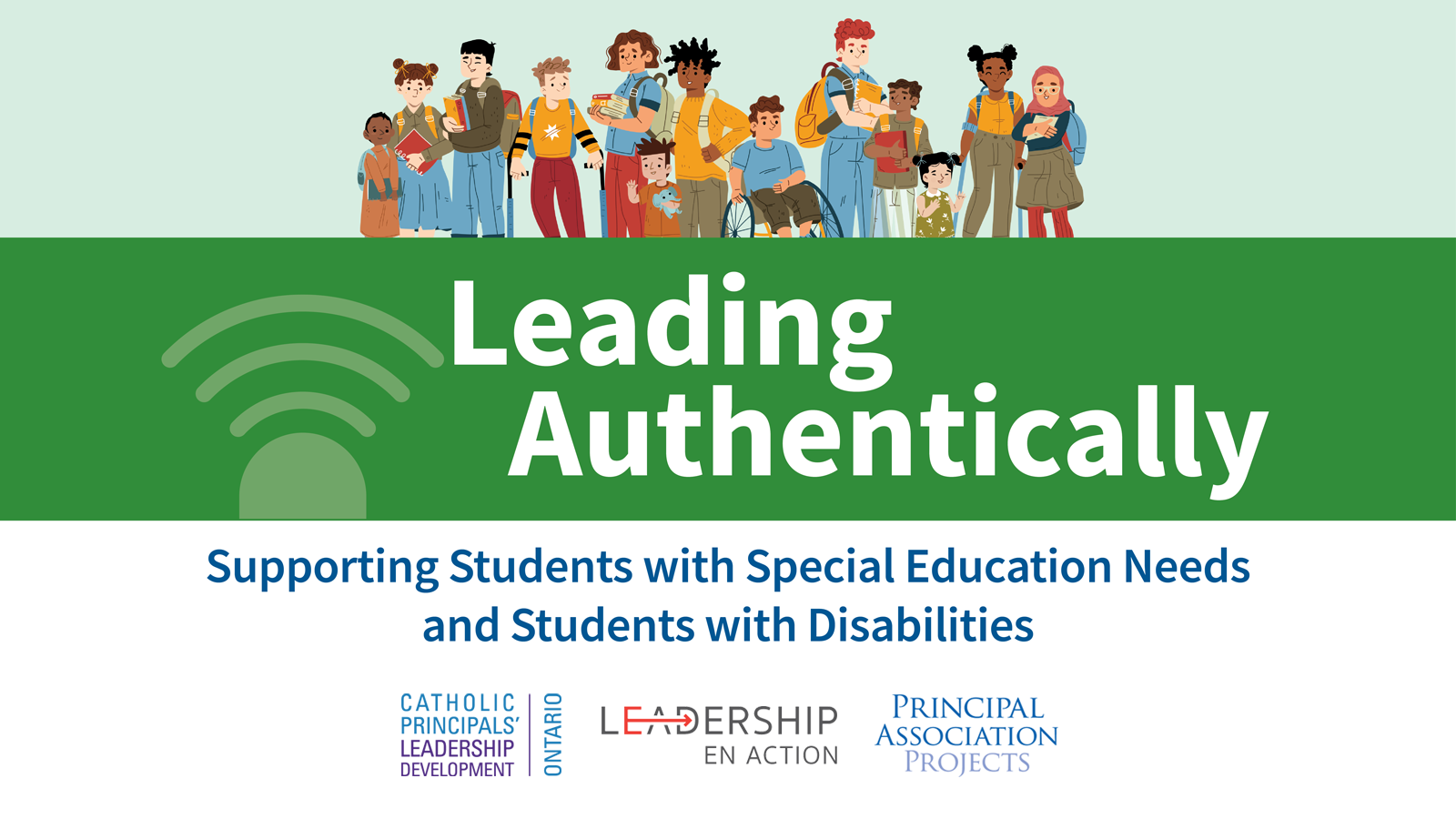
With the support of the Ontario Ministry of Education, the Catholic Principals' Leadership Development | Ontario, Leadership en action and Principal Association Projects, the service partners for Catholic Principals' Council of Ontario (CPCO), L'Association des directions et directions adjointes des écoles franco-ontariennes (ADFO) and Ontario Principals' Council are preparing a series of three podcast episodes for principals and vice-principals titled Supporting Students with Special Education Needs and Students with Disabilities - Leading Authentically.
These podcast episodes are being developed to highlight school leadership with a focus on equity, accessibility, inclusion and full participation for students with special education needs and students with disabilities.
Through this three-part series, principals and vice-principals will better understand how self-knowledge about their own complex identities can better prepare them to also learn about and understand the students whom they serve, to then intentionally and explicitly build inclusive learning environments.
Principals and vice-principals can use this as a vehicle to build capacity within their sphere of influence to support students with special education needs and students with disabilities. This podcast series offers opportunities for development as an individual or within a community of educators.
| Episode 1 - Leading Authentically - De-Centering Ourselves |
|
This first episode of the podcast focuses on self-awareness and knowledge. It offers a snapshot of the voices of principals and vice-principals across the province reflecting on their own awareness, knowledge, identities and positionality to highlight school leadership with a focus on equity, accessibility and inclusion.
Through self-reflection on a series of questions, this episode explores the experiences of school administrators defining their own identities. As you listen to the podcast, consider your leadership practices that may be
Reflection Questions From Episode 1
Consider: Where do we need to go to get to where we need to be?
Further Resources for Episode 1 |
| Episode 2 - Leading Authentically - Centering Our Students |
|
Episode 2 Transcript - Available soon!
This second episode focuses on school leadership that values student voice by centering the students we serve. Hear the voices of school administrators across the province as they consider their attitudes and believes, student belonging, and building relationships to highlight school leadership with a focus on equity, accessibility and inclusion centering on students with special education needs. Through self-reflection on a series of questions, this episode explores how centering the voice and experiences of students impacts their daily leadership practice. As you listen to the podcast, consider your leadership practices that:
Themes and Reflection Questions for Episode 2: Attitudes and beliefs matter: The presence of attitudinal barriers is a prevalent theme from parents when advocating for the child with special education needs. Parents share that attitudinal barriers often lead to social isolation and bullying, and limiting their children academically. These barriers are a significant factor in continuing marginalization of students with special education needs in the school system and that systemic efforts are needed to address this issue.
Access matters: Often students with special education needs are excluded physically, academically and socially. Parents have shared that exclusion and lack of access creates barriers to learning and relationship building.
Relationships matter: Forming relationships with parents and caregivers of students with special education needs is essential for a meaningful and robust educational and social experience for students.
Belonging matters: Research has shown the benefits of inclusive educational settings. Students with special education needs are more likely to be included in extracurricular and unstructured school activities in inclusive settings. These experiences provide a greater opportunity for belonging. Principals and vice principals care deeply about student belonging.
Source for themes above: Further Research to support inclusive education or centering those we serve: |
| Episode 3 - Leading Authentically - Re-centering Learning Environments for Student Success |
|
Episode 3 Transcipt - Available Soon! In the final episode of this series, listen to the voices of school administrators across the province and consider how these relationships work to create teaching and learning environments that reflect the fluid and responsive nature of the spaces and places that exist within school systems. This episode explores how centering the voice and experiences of students impacts daily leadership practice. As you listen to the podcast, consider your leadership practices that:
Themes and Reflection Questions for Episode 3:Competencies: Thinking about the OLF/OCLF Personal Leadership Resources, share some ways you have used your personal leadership resources to impact learning environment for all students? Can you share a story about your growth as a leader using your personal leadership resources to foster relationships with students, staff and families in order to create a positive, safe, identity-affirming environment for all students? Physical, social, and academic considerations: Share a story about how you have come to consider all aspects of inclusion when creating or revising learning spaces:
Consider the interconnection between these concepts; they are not discreet. For example, the physical environment (e.g., signage) can have unintended impacts on social inclusion. How might you continue to grow in this area? Setting the Tone: As you prepare for the school year, share a story that demonstrates how your leadership ensures the school climate is welcoming to all students and their families to a learning environment that creates a sense of belonging. When it comes to setting the tone for the school year, it’s not easy and can be unconsciously set depending on the many complexities in a school, what might be some ways you ensure that your decision-making process is transparent and reflects equity, inclusion and experiences of students, staff and community and nurtures a school climate that supports belonging? Instructional leadership: Principals are instructional leaders. What are some ways you are working with your educators and support staff to ensure that every student has what they need to learn? Consider universal design for learning, differentiated instruction, culturally relevant and responsive teaching and other enabling instructional practices. Building capacity with the multidisciplinary team: One of the most significant mechanisms that principals can leverage is the multidisciplinary team to support the learning of students with special education needs. What are some ways you are leveraging this team, along with the expertise of families and community partners to develop successful learning plans for students? Further research to support centering learning environments for student success:
The role of the school principal is pivotal in creating and promoting inclusive school environments (Ainscow, 2024; McGhie-Richmond & Haider, 2020; Porter et al., 2023; Sider & Maich, 2022). Big ideas for the importance of structuring learning environments to support inclusive education - and the ways in which principals enable these:
|






 Subscribe to this Page
Subscribe to this Page